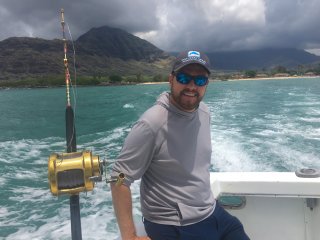Meet EPA Scientist Michael Nye, Ph.D.
EPA's Michael Nye, Ph.D., is a social scientist who studies sociodemographic systems, natural risk and decision making. He has worked in a variety of academic, industrial, and government roles in his career. Prior to joining EPA, he worked for the UK Environment Agency in flood risk management and emergency preparedness. He came to EPA as a social scientist and now manages EPA’s Net Zero Partnerships initiative, while finding time to lead other sustainability and water research projects.
How does your science matter?
I work on the human dimensions of EPA’s mission. My work is aimed at helping EPA better understand the states and communities we serve and how, as scientists, we can work more effectively with them to help solve the environmental problems that really matter to them.
This is particularly important in terms of “net zero” water, waste and energy strategies. Net zero programs and targets are cropping up all over the place in large and small communities, as well as organizations within the federal government. But oftentimes, these communities and organizations set net zero targets without really understanding how those goals can be achieved. Our science can help provide the answers communities need to achieve their goals or even go beyond them.
What do you like most about your research?
I like that my research looks at the intersection of people, behavior, and the environment. I also love crunching numbers and looking at statistics to find meaningful patterns in data, so I enjoy getting involved in work that allows me to do that.
My work is aimed at helping EPA better understand states and communities and how we can work together to solve the environmental problems that really matter to them.
Can you give an example of your current work?
Sure. I’m working with Denver Housing Authority, Colorado School of Public Health, Colorado State University, and a collection of other Denver-Metro-Area non-profits to better understand the connections between well-being and green neighborhood design.
The Sun Valley neighborhood, which is primarily a public housing project, is the poorest neighborhood in the Denver area. It also ranks poorly on many of our environmental quality and public health metrics such as air quality and incidence of asthma. The good news is that Sun Valley recently received a major Choice Neighborhoods Initiative grant from the Department of Housing and Urban Development to completely revitalize and redevelop Sun Valley into an Eco District. Everything will change from the layout of the streets, to new parks/ green spaces, and new houses for the residents. So this is a really great opportunity to apply our Human Well Being Index to Sun Valley now and after redevelopment is complete to get a data-driven measurement of just how much quality of life improves for Sun Valley residents as environmental conditions improve.
I’m so excited to get to be a part of this multidisciplinary project alongside great colleagues from our National Health and Environmental Effects Research Laboratory and EPA Region 8. It truly is a One EPA project.
When did you first know you wanted to be a scientist?
I was always interested in pursuing science as a career. And I always knew it would be connected to the natural environment and conservation. I lovelike spending time in the outdoors, especially forests and rivers.
If you could have dinner with any scientist, past or present, who would you choose and what would you like to ask them?
I would choose Louis Theroux. He’s a British documentary filmmaker who makes documentaries about current cultural and social issues. I call him a scientist because he operates on a practical level as a cultural anthropologist when making his documentaries. Louis' ability to establish a rapport with just about anyone and to elicit deeply meaningful and interpretive insights from interviews about sensitive subjects is the best I have ever seen. He’s a master of qualitative data collection, interpretation, and analysis. If I were still teaching research methods, his documentaries would be required course viewing material!

Tell us about your background.
I have bachelors’ degrees in Political Science and Sociology from Colorado State University. I received a master’s degree in Sociology from Trinity College in Dublin, Ireland. For my PhD, I studied Geography at the University of Cambridge in the United Kingdom. My PhD research was on the development of carbon trading regimes and the behavior of regulated firms in carbon markets.
What would you be doing if you weren't a scientist?
I’d probably be a trout fishing guide or a ski bum living somewhere in Idaho or Montana.
Any advice for students considering a career in science?
For a student interested in the social sciences who wants to operate outside of academia, you need to be proactive. That means challenging conventional scientific understanding and framing of things like risk, the drivers of decision-making, what it means to have meaningful stakeholder engagement, and what it means to have public benefit. You need to be ready to defend the value of those evaluations with scientific evidence. I think too often social scientists bring criticism on themselves by not measuring the outcomes of what they do.
Editor's Note: The opinions expressed herein are those of the researcher alone. EPA does not endorse the opinions or positions expressed.
